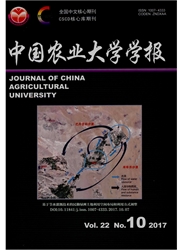

 中文摘要:
中文摘要:
探讨Mce4E蛋白在牛结核分枝杆菌致病机理中的作用。以Mce4E蛋白刺激肺泡巨噬细胞24和48h后,MTT检测分析表明。Mce4E蛋白对巨噬细胞的活性有显著的抑制作用(P〈0.05);用重组表达的Mce4E蛋白、人分枝杆菌纯化蛋白衍生物(Purified Protein Derivative of M.tuberculosis,MtbPPD)、牛结核分枝杆菌纯化蛋白衍生物(Purified Protein Derivative of M.bov/s,MbPPD)、卡介苗(Bacille Calmette Guerin,BCG)和刀豆蛋白A(concanavalin A,ConA)分别刺激肺泡巨噬细胞48h后,real—time PCR方法检测显示,Mce4E蛋白能够促使牛肺泡巨噬细胞TNF-α和IL-6mRNA的表达上调(P〈0.05)、抑制肺泡巨噬细胞iNO的mRNA表达(P〈0.05)而对IL-12表达没有影响(P〉0、05)。Mce4蛋白能够促使肺泡巨噬细胞分泌炎性细胞因子。并对肺泡巨噬细胞有抑制作用,证实Mce4蛋白在分枝杆菌中具有重要的作用。
 英文摘要:
英文摘要:
A large body of research has confirmed that mammalian cell entry proteins (Mce) are related to the virulent Mycobacterium bovis. MTT (3, (4, 5 dimethylthiazol-2yl)-2, 5 diphenylc-tetrazolium bromide) analysis showed that Mce4E protein could inhibit macrophage activity. In real-time RT-PCR assay, Mce4E protein stimulated alveolar macrophage for 48 hours, which significantly (P 〈 0.05) induced the expression of TNF-α and enhanced IL-6 mRNA but the expression of iNO was reduced (P〈 0.05). There was no effect on the IL-12 expression in the macrophage. We conclude that Mce4E proteins can induce an inflammatory response on exposure to M. boris and therefore play an important role in the immune response.
 同期刊论文项目
同期刊论文项目
 同项目期刊论文
同项目期刊论文
 期刊信息
期刊信息
